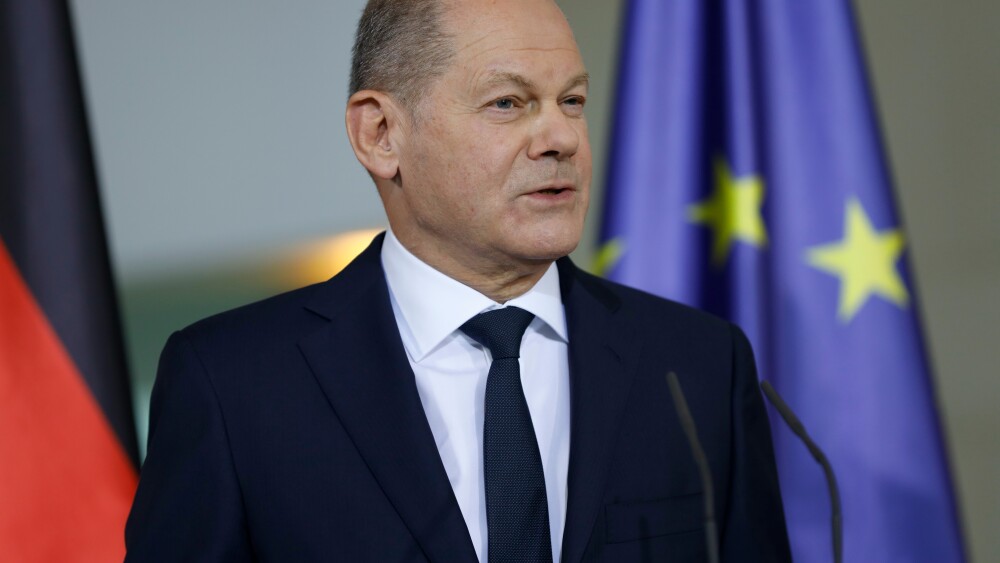Nearly one year after the Iranian regime-backed Hamas movement launched its latest war to eradicate the Jewish state, Germany’s center-left government has abandoned Israel.
Shortly after October 7, Chancellor Olaf Scholz came to Israel and delivered a pledge of unconditional solidarity with Jerusalem. “In difficult times, Germany has only one place and that is by Israel’s side,” he said. “Germany supports the security of Israel and its citizens.”
The collapse of tangible German solidarity for Israel was illustrated on Sunday when the Bild daily reported that Berlin has not approved important weapons deliveries to the Jewish state but has green-lighted armaments for Qatar’s regime—the main financier of Hamas.
Baerbock’s blame-Israel war statement coincided with the discovery of a Hezbollah drone containing German technology that hit near Kibbutz Dan in late August.
Just last week, Germany’s Foreign Minister Annalena Baerbock blamed Israel, not terrorists, for endangering hostages held by Hamas. “Last weekend clearly showed that military action alone will not solve the situation in Gaza,” she said, according to a report in Bild. “Purely military pressure, as we have seen, endangers the lives of the hostages.”
There was scarce resistance to Baerbock’s blame the Jews statement in Germany. The Christian Democratic Union (CDU) politician Julia Klöckner, a former minister of food and agriculture, was a notable exception. She said of Baerbock, “The fact that she is now blaming Israel’s military actions for the murder of the hostages and calling for Israel to completely give up fighting is a perpetrator-victim reversal.”
Germany’s ambassador to Jerusalem Steffen Seibert, whom Israel’s government has twice reprimanded for anti-Israel and pro-Palestinian terrorism activity, zealously spread Baerbock’s talking points on X.
Seibert participated in an “alternative” memorial for victims of terrorism, including Hamas terrorists, before October 7. I strongly suspect history will record him as Germany’s worst ambassador to Israel. His activity suggests he should be running Germany’s anti-Israel consulate in Ramallah.
A second exception to the mainstream anti-Israel political consensus in Germany is CDU Bundestag deputy Roderich Kiesewetter, a member of the Committee on Foreign Affairs. He told German radio that the government must “finally wake up” about the worsening situation in the Mideast. He added that Germany could play a role in refueling combat aircraft that are defending Israel, and also to use Eurofighter aircraft to fend off Iranian drones. His CDU party members turned him to a pariah for his remarks about aiding Israel.
The largely anti-Israel Green party foreign minister Baerbock’s blame-Israel-for-the-Hamas war statement coincided with the discovery of a Hezbollah drone containing German technology that was launched into Israel in late August and hit near Kibbutz Dan.
An Israeli report revealed that Hezbollah’s drone included technology from the German company 3W-International. Berlin’s lax enforcement of sanctions on dual-use technology (material that can be used for both military and civilian purposes) has been a longstanding problem. For example, construction material from the Stuttgart region-based Krempel Group was found in Iranian rockets used in two chemical attacks on Syrian civilians in 2018. The poison gas attacks injured 24 people. Germany’s Federal Office for Economic Affairs and Export Control (BAFA) did not object to the sale of the technology to Iran.
The shift to pin responsibility on the Jewish state for the Hamas war is ubiquitous. Even the opposition Christian Democratic Union is not immune from the classical antisemitic worldview.
Michael Blume, the CDU commissioner tasked with fighting antisemitism in Baden-Württemberg, told German media in May, “We clearly notice that Israel-related antisemitism is increasing sharply.” He attributed the rise in anti-Israel expressions to the leadership in Jerusalem. “Right-wing extremists from Israel, the U.S. and Europe, and also the Netanyahu government, use the accusation of antisemitism in an inflationary way and exploit it. That doesn’t help us at all if we want to fight antisemitism honestly,” he said.
One wonders if the famous quip by the Israeli psychoanalyst Zvi Rex is playing out during this war: The Germans will never forgive the Jews for Auschwitz.
For Blume, Hamas is not generating lethal antisemitism; rather the Israeli government is doing it because it seeks to defeat Hamas.
The Munich-based Holocaust survivor Roman Haller, who served as the chairman of the Jewish Claims Conference, termed Blume’s remark “pure antisemitism” and urged him to resign. Blume’s antisemitic remarks were embraced by CDU city councilman Rolf Kurfess in Blume’s hometown of Filderstadt. Germany’s federal commissioner tasked with antisemitism, Felix Klein, went silent about Blume’s antisemitism that blanketed the Federal Republic’s media.
Both the German federal government and the Green party-CDU coalition in Baden-Württemberg state have repeatedly stated that “There is no place for antisemitism.” Clearly, there is a place for Jew-hatred in in the Federal Republic. State-sponsored German antisemitism is highly dangerous.
Daniela Ludwig, a deputy in the Bundestag who serves as the commissioner for Israel and to combat antisemitism for the CDU and the Christian Social Union party, went silent about the CDU antisemitism scandal. Ludwig has shown no appetite to push for needed weapons deliveries to Israel.
The futility of rhetoric is a common feature of post-WWII Germany with respect to combating antisemitism. For Germany—whose raison d’état post-Holocaust is supposed to be “Never Again” about the Shoah and “Nip it in the bud” when antisemitism surfaces, the indifference toward Israel’s existential war against the Islamic Republic of Iran and its allies reveals its expressions of solidarity with the Jewish state to be mere platitudes.
One wonders if the famous quip by the Israeli psychoanalyst Zvi Rex is playing out during this war: The Germans will never forgive the Jews for Auschwitz. A variation of the phrase might be: The Germans will never forgive Israel for defending itself against Hamas.
Published originally under the title “Germany Should Stop Blaming Israel for the Hamas War Against the Jews.”








